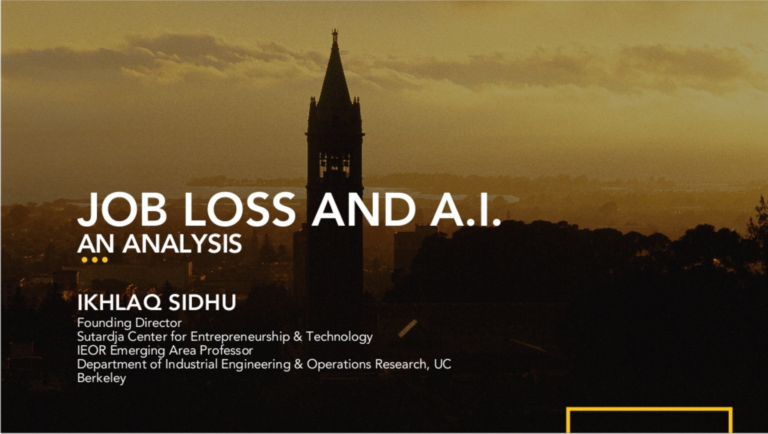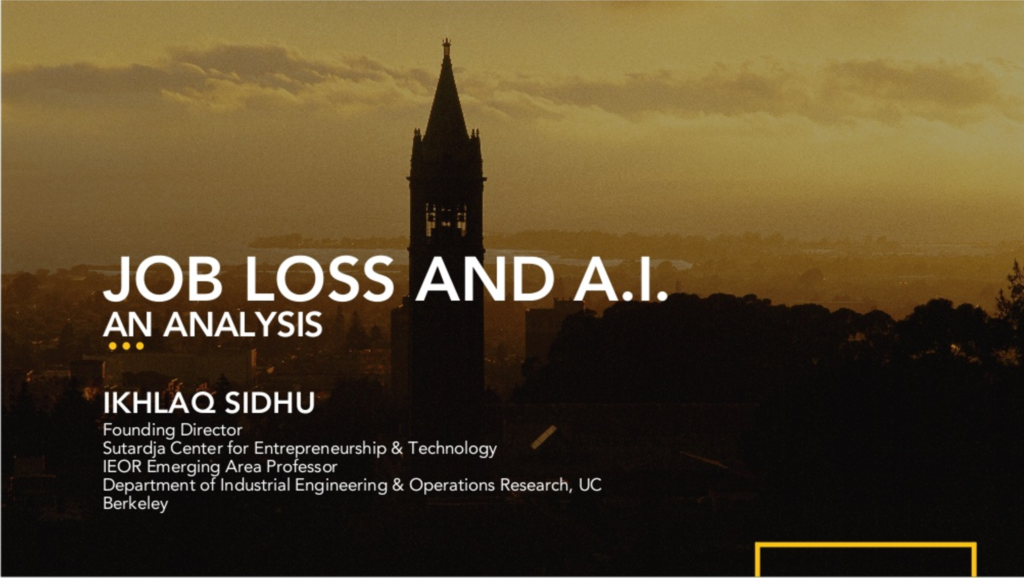Artificial Intelligence (A.I.) is currently one of the most popular topics in industry, academia, and the press, with seemingly endless applications in everything from matchmaking to self-driving cars. Tesla, Google, and many others have demonstrated that even today, these algorithms have an awesome power in that they make it possible for machines to emulate what could previously only be done with human judgment and human decision. And while the field is still developing, industries all around us are preparing for a massive redesign on a scale many times larger and more profound than during the last industrial revolution.
From a government and popular viewpoint, however, there is a large and growing debate on what this means for our global economy and what it means for the potential of mass job loss. A number of studies have shown that on the order of 50% of every job on the planet could potentially be replaced with A.I. technologies and robotics. We are actually not so pessimistic, but it’s safe to say there is a wide range of opinion and concern on this topic.
LINK TO AI AND JOB LOSS SLIDES
We took the time to analyze the main the arguments and boil them down into a compact form. The results are available at this presentation at SlideShare. We’ve looked at the issues of job loss potential, economic growth, new job categories, transient or timing effects, and a range of policy viewpoints for this upcoming transition over the next 5 to 12 years.
Note, in our analysis, we did not go as far as to compare the longer-term path options between a) the apocalyptic viewpoint of a singularity where AI and robots merge and control with humankind vs b) what we would argue as the more likely and sensible outcome of “Multiplicity” defined by leading Berkeley AI researcher Ken Goldberg in this Wall Street Journal article (article text) as a state of greater productivity to solve the world’s challenges through a combination of machine learning, wisdom of crowds, and cloud computing. By this introduction, the reader can probably guess that for the long term, we are supporters of the optimistic side of “multiplicity” vs “singularity.”
Prof. Sidhu will join Stephen Hawking and other experts on October 18, 2017 as a keynote speaker at GMIC Hong Kong 2017 to present findings on A.I. and job loss as well as other research from UC Berkeley and the Sutardja Center.
Artificial Intelligence (A.I.) is currently one of the most popular topics in industry, academia, and the press, with seemingly endless applications in everything from matchmaking to self-driving cars. Tesla, Google, and many others have demonstrated that even today, these algorithms have an awesome power in that they make it possible for machines to emulate what could previously only be done with human judgment and human decision. And while the field is still developing, industries all around us are preparing for a massive redesign on a scale many times larger and more profound than during the last industrial revolution.
From a government and popular viewpoint, however, there is a large and growing debate on what this means for our global economy and what it means for the potential of mass job loss. A number of studies have shown that on the order of 50% of every job on the planet could potentially be replaced with A.I. technologies and robotics. We are actually not so pessimistic, but it’s safe to say there is a wide range of opinion and concern on this topic.
LINK TO AI AND JOB LOSS SLIDES
We took the time to analyze the main the arguments and boil them down into a compact form. The results are available at this presentation at SlideShare. We’ve looked at the issues of job loss potential, economic growth, new job categories, transient or timing effects, and a range of policy viewpoints for this upcoming transition over the next 5 to 12 years.
Note, in our analysis, we did not go as far as to compare the longer-term path options between a) the apocalyptic viewpoint of a singularity where AI and robots merge and control with humankind vs b) what we would argue as the more likely and sensible outcome of “Multiplicity” defined by leading Berkeley AI researcher Ken Goldberg in this Wall Street Journal article (article text) as a state of greater productivity to solve the world’s challenges through a combination of machine learning, wisdom of crowds, and cloud computing. By this introduction, the reader can probably guess that for the long term, we are supporters of the optimistic side of “multiplicity” vs “singularity.”
Prof. Sidhu will join Stephen Hawking and other experts on October 18, 2017 as a keynote speaker at GMIC Hong Kong 2017 to present findings on A.I. and job loss as well as other research from UC Berkeley and the Sutardja Center.



